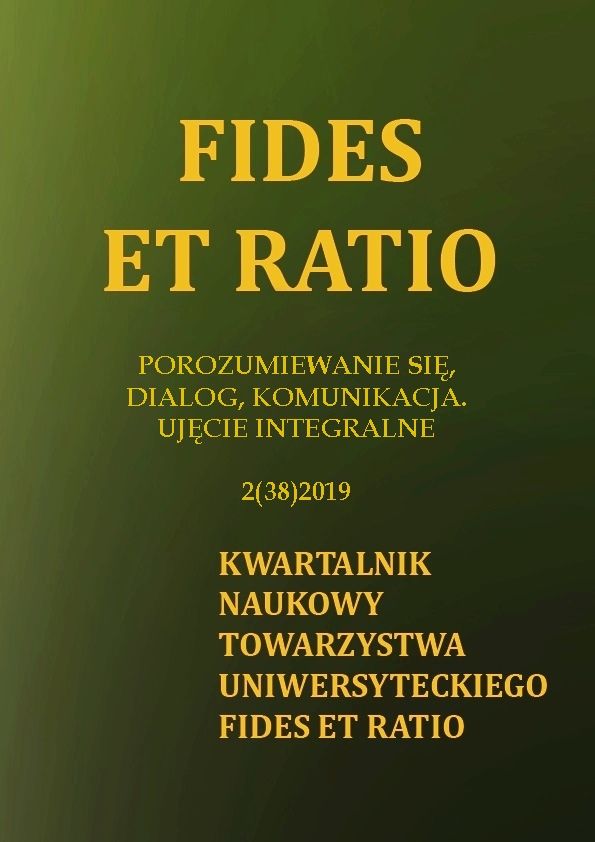Abstract
Spirituality and religion as well as body and mind are important aspects of human life. It turns out that these are values having importance for individuals as well as for interpersonal relationships. This is very complex part of marital and family life which can fulfill many adaptive functions. Spirituality and religiosity have a impact on many areas of functioning such as couple's commitment, overall satisfaction with relationship, persistence of the marriage or decision about divorce, communication and conflict soling (Mahoney et al., 2001). Joint prayer and religious communication can affect the spiritual development of each spouse and contributes to better coping with difficult situations. Moreover, issues to which attention should be paid are the functioning of relationships of persons with different religious views and the significance of the spiritual life of husbands for the functioning of marriage. This article focuses on the connections between spirituality and religiosity with satisfaction, religious communication and problem solving in romantic relationships.References
Butler, M. H., Stout, J. A., & Gardner, B. C. (2002). Prayer as a conflict resolution ritual: Clinical implications of religious couples' report of relationship softening, healing perspective, and change responsibility. The Journal of Family Therapy, 30(1), 19-37.
Curtis, K. T., Ellison, C. G. (2002). Religious heterogamy and marital conflict: Findings from the National Survey of Families and Households. Journal of Family Issues, 23(4), 551-576.
David, P., Stafford, L. (2015). A relational approach to religion and spirituality in marriage: The role of couples’ religious communication in marital satisfaction. Journal of Family Issues, 36(2), 232-249.
DeMaris, A., Mahoney, A., Pargament, K. I. (2010). Sanctification of marriage and general religiousness as buffers of the effects of marital inequity. Journal of Family Issues, 31(10), 1255-1278.
Fincham, F. D., Ajayi, C., Beach, S. R. (2011). Spirituality and marital satisfaction in African American couples. Psychology of Religion and Spirituality, 3(4), 259.
Fincham, F. D., Beach, S. R., Lambert, N., Stillman, T., Braithwaite, S. (2008). Spiritual behaviors and relationship satisfaction: A critical analysis of the role of prayer. Journal of Social and Clinical Psychology, 27(4), 362-388.
Heszen-Niejodek, I., Gruszczyńska, E. (2004). Wymiar duchowy człowieka, jego znaczenie w psychologii zdrowia i jego pomiar. Przegląd Psychologiczny, 47(1), 15-31.
Hill, P.C., Pargament, K.I., Hood, R.W., Jr., McCullough, M.E., Swyers, J.P., Larson, D.B. Zinbauer, B.J. (2000). Conceptualizing religion and spirituality: Points of commonality, points of departure. Journal for the Theory of Social Behaviour, 30, 51-77.
Jarosz, M. (2010). Pojęcie duchowości w psychologii. Studia z Psychologii w KUL, 16, 9-22.
Kusner, K.G., Mahoney, A., Pargament, K.I., DeMaris, A. (2014). Sanctification of marriage and spiritual intimacy predicting observed marital interactions across the transition to parenthood. Journal of Family Psychology, 28(5), 604-614.
Larson, P.J., Olson, D.H. (2004). Spiritual beliefs and marriage: A national survey based on ENRICH. The Family Psychologist, 20(2), 4-8.
Lichter, D. T., Carmalt, J. H. (2009). Religion and marital quality among low-income couples. Social Science Research, 38(1), 168-187.
Mahoney, A., Pargament, K. I., Tarakeshwar, N., Swank, A. (2001). Religion in the home in the 1980s and 90s: A meta-analytic review and conceptual analysis of religion, marriage, and parenting. Journal of Family Psychology, 15, 559–596.
Mahoney, A., Tarakeshwar, N. (2005). Religion’s role in marriage and parenting in daily life and during family crises. Handbook of the psychology of religion and spirituality, 177-195.
Reiter, M. J., Gee, C. B. (2008). Open communication and partner support in intercultural and interfaith romantic relationships: A relational maintenance approach. Journal of Social and Personal Relationships, 25(4), 539-559.
Rostami, A.M., Gol, H.C. (2014). Prediction of marital satisfaction based on spiritual intelligence. Procedia-Social and Behavioral Sciences, 116, 2573-2577.
Smurzyńska, A. (2012). Dusza-umysł-ciało. Rozważania nad triadyczną antropologią. Racjonalia. Z punktu widzenia humanistyki, (2), 182-192.
Sullivan, K.T. (2001). Understanding the relationship between religiosity and marriage: An investigation of the immediate and longitudinal effect of religiosity on newlywed couples. Journal of Family Psychology, 15, 610–626.
